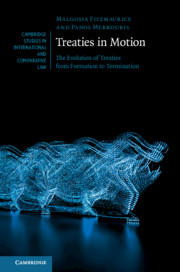Book contents
- Treaties in Motion
- Cambridge Studies in International and Comparative Law: 149
- Treaties in Motion
- Copyright page
- Contents
- Figures
- Tables
- Acknowledgements
- List of Abbreviations
- Table of Cases
- Table of Treaties
- 1 Motion as a Notion
- 2 Treaty Genesis
- 3 Consent to Be Bound
- 4 Treaty Interpretation and Its Rules
- 5 Amendment/Modification/Revision of Treaties
- 6 Treaties and Their Phthora
- 7 Concluding Remarks
- Bibliography
- Index
- Cambridge Studies in International and Comparative Law
1 - Motion as a Notion
Published online by Cambridge University Press: 05 June 2020
- Treaties in Motion
- Cambridge Studies in International and Comparative Law: 149
- Treaties in Motion
- Copyright page
- Contents
- Figures
- Tables
- Acknowledgements
- List of Abbreviations
- Table of Cases
- Table of Treaties
- 1 Motion as a Notion
- 2 Treaty Genesis
- 3 Consent to Be Bound
- 4 Treaty Interpretation and Its Rules
- 5 Amendment/Modification/Revision of Treaties
- 6 Treaties and Their Phthora
- 7 Concluding Remarks
- Bibliography
- Index
- Cambridge Studies in International and Comparative Law
Summary
The laws of treaties are in constant motion and state of flux, which has different connotations. It relates to motion through time and also the manifestation (or lack thereof) of change. The basic principle of the definition of motion, adopted by the authors, is based on the philosophy of Aristotle. He identified six types of motion: creation (genesis), increase (auxesis), diminution (meiosis), alteration (alloiosis), destruction (phthora), and change of place (kata topon metabole). This last type of motion has been amended by the authors to change in space-time (kata topon kai chronon metavole) to reflect our modern scientific understanding of time as a dimension through which motion and change occurs.
- Type
- Chapter
- Information
- Treaties in MotionThe Evolution of Treaties from Formation to Termination, pp. 1 - 22Publisher: Cambridge University PressPrint publication year: 2020

